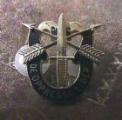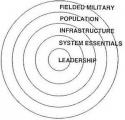Obviously guys like George Washington are rare cats, who when presented with the opportunity to take absolute power unto them self, instead remain absolutely resolute to the principles of the movement itself.
WILF rolls out Sierra Leone as a recent example of where military force defeated the insurgency. I must admit, I have not studied this insurgency much, but the small amount I have read it appeared to be much more a small band without significant popular support fighting for the power and profit associated with control of the Diamond industry. That is more like a Western American "range war" than an insurgency; and such efforts have no "roots" so to speak, so can be eradicated and done with.
The key remains the populace and making a fair and accurate assessment of where their loyalties lie. Obviously every populace is a complex mosaic, and few assessors, be they insurgent, colonial, or national government will be unbiased and probably over value their own stakes accordingly.
If a movement has no root in populace desire to get rid of existing governance (rather than promote some new governance - that is us focusing on what is being promoted rather than what is being resisted) it probably isn't really an insurgency.





 Reply With Quote
Reply With Quote













Bookmarks